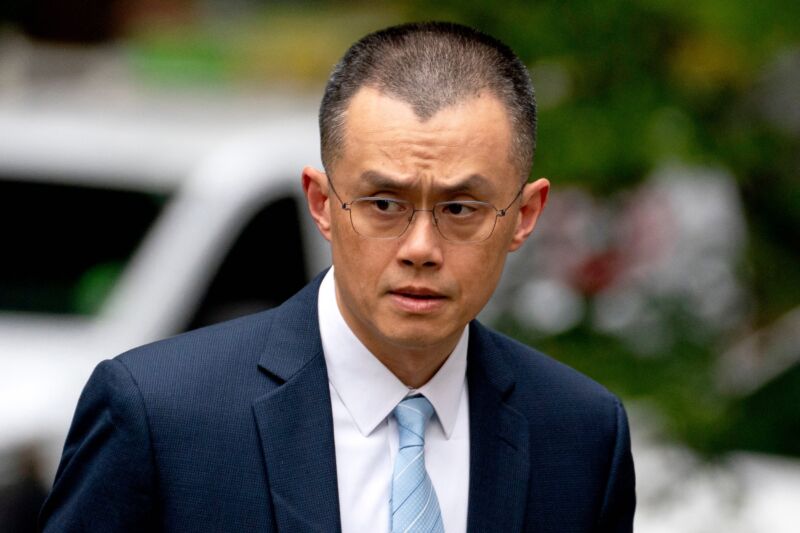
Getty Images | Changpeng Zhao
Binance founder Changpeng Zhao was sentenced today to four months in prison after pleading guilty of failing to take effective measures against money laundering. The billionaire who formerly ran the world’s largest cryptocurrency exchange previously agreed to a plea deal that also required him to pay a $50 million fine.
The US government’s sentencing request asked for three years in prison. Zhao’s sentencing memorandum asked for probation without any prison time.
Forbes estimates Zhao’s net worth at $33 billion. He pleaded guilty to failure to maintain an effective anti-money laundering program.
Zhao’s cooperation with law enforcement was cited by US District Judge Richard Jones as a reason for imposing a significantly lower sentence than was requested by prosecutors, according to The Verge.
“Before handing down the sentence, Jones faulted Zhao for putting growth and profits before complying with US laws,” Reuters wrote. The sentencing hearing was in federal court in Seattle.
Jones was quoted as saying to Zhao that “you had the wherewithal, the finance capabilities, and the people power to make sure that every single regulation had to be complied with, and so you failed at that opportunity.”
US: Zhao willfully violated law
The government’s sentencing recommendation said that “Zhao’s willful violation of US law was no accident or oversight. He made a business decision that violating US law was the best way to attract users, build his company, and line his pockets.”
The US said Zhao bragged that if Binance complied with US law, it would not be “as big as we are today.”
“Despite knowing Binance was required to comply with US law, Zhao chose not to register the company with US regulators; he chose not to comply with fundamental US anti-money-laundering (AML) requirements; he chose not to implement and maintain an effective know-your-customer (KYC) system, which prevented effective transaction monitoring and allowed suspicious and criminal users to transact through Binance,” the US said.
Zhao also “directed Binance employees in a sophisticated scheme to disguise their customers’ locations in an effort to deceive regulators about Binance’s client base,” the US told the court.
Zhao’s sentencing memorandum denied criminal intent. “Generalized knowledge that the Company’s compliance program did not eliminate all risk of criminal activity does not mean that Mr. Zhao knew or intended for any funds to be criminally derived (he manifestly did not),” the filing said.
Zhao traveled to the US from his home in the United Arab Emirates to take responsibility, his legal team’s filing said. “He is a first-time, non-violent offender who committed an offense with no intention to harm anyone. He presents no risk of recidivism. He has appeared in this country voluntarily to accept responsibility,” the plea for lenience said.
